|
|
|
Sort Order |
|
|
|
Items / Page
|
|
|
|
|
|
|
| Srl | Item |
| 1 |
ID:
138289
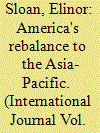

|
|
|
|
|
| Summary/Abstract |
This paper examines the impact of the US pivot to the Asia-Pacific on Canada’s strategic thinking and maritime posture. It highlights elements of the US rebalance before examining Canada’s recent past, present, and future strategic and military engagement. Canada wants to be able to contribute to crisis de-escalation if regional tensions lead to conflict, yet the Royal Canadian Navy has less deployment capacity today than it has had in 25 years. To contribute to mediatory influence, and provide warfighting capability, a recapitalized navy should increase deployments to the region, forward deploy some naval assets, and ensure interoperability with its US counterpart. In the event of a crisis, a choice might have to be made between a neutral, honest-broker stance and a more likely decision to contribute forces to a US-led coalition. The first step in either case is to be in the Asia-Pacific region with capable and credible naval forces.
|
|
|
|
|
|
|
|
|
|
|
|
|
|
|
|
| 2 |
ID:
181935
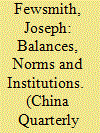

|
|
|
|
|
| Summary/Abstract |
In recent years, explanations of the Chinese Communist Party's longevity as a ruling party have focused on institutionalization. But a close look at the four leaders of China since 1978 reveal that institutions have remained weak. Of much greater importance have been balances that reflect the informal distribution of power and norms that express agreed-upon Party procedures. Of yet even greater importance have been the efforts of individual leaders to concentrate power in themselves through the appointment of protégés to critical positions. Such leaders also attempt to extend their influence beyond their terms in office through those protégés and their roles as “elders.” Thus, we see a tension between Party norms and the centralizing tendencies of Leninist systems in which the centralizing tendencies usually prevail. With Xi Jinping, we see a far greater personalization of power disrupting the norms and balances existing under previous leaders.
|
|
|
|
|
|
|
|
|
|
|
|
|
|
|
|
| 3 |
ID:
097266


|
|
|
|
|
| Publication |
2010.
|
| Summary/Abstract |
The increasing resources, albeit largely financial, that the European Union has committed to the Israeli-Palestinian relationship has led to increasing calls for the EU to take a greater political role in the peace process. In this essay the potential role of the EU in the Israeli-Palestinian conflict is examined in relation to that of the United States. For the EU to play a more influential role in the peace process, neither a pure balancing nor a pure bonding strategy is likely to work. Instead, the most promising strategy for the EU would be a bonding strategy combined with a threat to balk, to simply withhold support from US initiatives if Europe's views are not taken into account.
|
|
|
|
|
|
|
|
|
|
|
|
|
|
|
|
| 4 |
ID:
184396
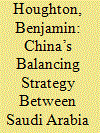

|
|
|
|
|
| Summary/Abstract |
Since Deng Xiaoping's opening-up policy and drive for economic modernisation and reform in the late 1970s, and especially since China's foreign energy requirements skyrocketed in 1993, Beijing's interests in the Persian Gulf have grown immensely. A staple of its regional policy has been an insistence on cultivating relations with all states, something that has necessitated a careful balancing act between regional rivals, especially Saudi Arabia and Iran. This article examines China's strategy to balance relations with these two states, especially during periods of tension, such as following the 2019 drone attacks on Saudi oil facilities, something that Riyadh accused Iran of masterminding. Following an examination of this strategy, the article explores Saudi attempts to coax Beijing away from Tehran and Saudi perceptions of Sino-Iranian relations through the lens of the 2021 25-year agreement between China and Iran, questioning whether Sino-Iranian relations are a bone of contention in Sino-Saudi relations.
|
|
|
|
|
|
|
|
|
|
|
|
|
|
|
|
| 5 |
ID:
189285
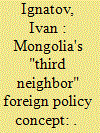

|
|
|
|
|
| Summary/Abstract |
This paper examines the history and characteristic features of the "Third Neighbor" concept that has guided Mongolia's foreign policy since the 1990s and prospects for its modification in the current era. The author describes the circumstances under which the concept arose and the Mongolian government's reasons for adopting it. Its features and differences from the approaches of other "small countries" conducting a multivector foreign policy are analyzed. Other factors considered are the geopolitical situation in Southeast Asia, Mongolia's geographic position, its historical experience of submission to neighboring powers, its economic problems, and the efforts of the local elite to ensure the dominance of Western values in the country since 1990. The author studies the approaches of "Third Neighbor" countries to partnership with Mongolia and their motives, noting the transition from the predominant rendering of humanitarian assistance in the initial stage to instituting mutually beneficial bilateral projects since the early 2000s. Special attention is given to gradually emerging differences between the interests and priorities of Western and Eastern
|
|
|
|
|
|
|
|
|
|
|
|
|
|
|
|
| 6 |
ID:
038006
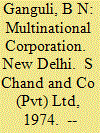

|
|
|
|
|
| Publication |
New Delhi, S Chand and Co (Pvt) Ltd, 1974.
|
| Description |
x, 112p.
|
|
|
|
|
|
|
|
|
|
|
|
Copies: C:1/I:0,R:0,Q:0
Circulation
| Accession# | Call# | Current Location | Status | Policy | Location |
| 013089 | 338.88/GAN 013089 | Main | On Shelf | General | |
|
|
|
|
|
|
|
|
|